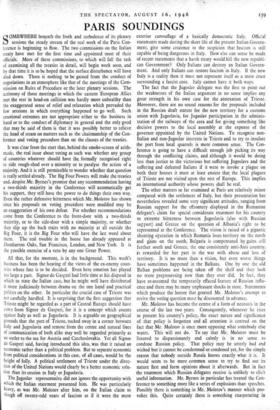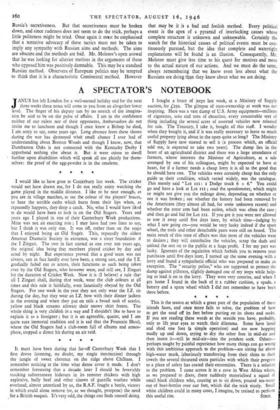PARIS SOUNDINGS
OMEWHERE beneath the froth and turbulence of its plenary sessions the steady stream of the real work of the Paris Con- ference is beginning to flaw. The two commissions on the Italian treaty have met for the first time ana appointed most of their officials. More of these commissions, to which will fall the task of examining all the treaties in detail, will begin work soon, and by that time it is to be hoped that the surface distu.rbance will have died down. 'There is nothing to be gained from the conduct of negotiations in an atmosphere like that of the meetings of the Com- mission on Rules of Procedure or the later plenary sessions. The acrimony of those meetings in which the eastern European Allies met the rest in head-on collision was hardly more unhealthy than the exaggerated sense of relief and relaxation which pervaded the few sessions in which everything happened to go well. Such emotional extremes are not appropriate either to the business in hand or to the conduct of diplomacy in general and the only good that may be said of them is that it was possibly better to relieve the head of steam on matters such as the chairmanship of the Con- ference and voting procedure than on the clauses of the treaties.
It was clear from the start that, behind the smoke-screen of arith- metic, the real issue about voting as such was whether any group of countries whatever should have the formally recognised right to ride rough-shod over a minority or to paralyse the action of a majority. And it is still permissible to wonder whether that question is really settled already. The Big Four Powers will make the treaties and, despite Mr. Byrnes's promise that any recommendation having a two-thirds majority in the Conference will automatically get his support, they still have the power to do things their own way. Even the rather defensive bitterness which Mr. Molotov has shown since his proposals on voting procedure were modified may be an exaggeration of his_ own defeat. For whether recommendations come from the Conference to the front-door with a two-thirds majority, or to the side-door with a simple majority, or whether they slip up the back stairs with no majority at all outside the Big Four, it is the Big Four who will have the last word about them. The 'real trouble in the house has already appeared at Dumbarton Oaks, San Francisco, London, and New York. It is the possible exercise of a veto by any one Great Power.
All that, for the moment, is in the background. This week's business has been the hearing of the views of the ex-enemy coun- tries whose fate is to be decided. Even here emotion has played too large a part. Signor de Gasperi had little time at his disposal in which to state the Italian case, but he might well have distributed it more judiciously between drama on the one hand and practical politics on the other. In particular the crucial case of Trieste was not carefully handled. It is surprising that the first suggestion that Trieste might be regarded as a part of Central Europe should have come from Signor de Gasperi, for it is a concept which counts against Italy as well as Jugoslavia. It is arguable on geographical grounds that the port of Trieste, tucked away in a corner between Italy and Jugoslavia and remote from the centre and natural lines of communication of both alike may well be regarded primarily as an outlet to the sea for Austria and Czechoslovakia. Yet all Signor de Gasperi said, having introduced this idea, was that it raised an economic rather than a political problem. But to separate' economic from political considerations in this case, of all cases, would be the height of folly. A political settlement of Trieste under the direc- tion of the United Nations would clearly be a better economic solu- tion than its cession to Italy or Jugoslavia. -•The Jugoslav representative did not ignore the opportunity with which the Italian statement presented him. He was particularly heavy, as was Mr. Molotov after him, on the Italian claim to Slough off twenty-odd years of fascism as if it were the mere exterior camouflage of a basically democratic Italy. Official statements made during the short life of the present Italian Govern- ment, give some credence to the suspicion that fascism is still capable of being dangerous in Italy. How else can sense be made of recent statements that a harsh treaty would kill the new republi- can Government? Only Italians can destroy an Italian Govern- ment. And only Italians can restore fascism in. Italy. If the new Italy is a reality then it must not represent itself as a mere Crust surrounding a fascist core. Italy cannot have it both ways.
The fact that the Jugoslav delegate was the first to point out the weaknesses of the Italian argument in no sense implies any great strength in his own case for the annexation of Trieste. Moreover, there are no sound reasons for the proposals included in the Russian draft statute for the new territory for a customs union with Jugoslavia, for Jugoslav participation in the adminis- tration of the railways of the area and for giving something like decisive powers to the local assembly at the expense of the governor appointed by the United Nations. To recognise non- Italian and non-Jugoslav interests in Trieste and to try to insulate the port from local quarrels is mere common sense. The Con- ference is going to have a difficult enough job picking its way through the conflicting claims, and although it would be doing less than justice to the victorious but suffering Jugoslays and the suffering and defeated Italians if it were to invoke a plague on both their houses it must at least ensure that the local plagues of Trieste are not visited upon the rest of Europe. This implies an international authority whose powers shall be real.
The other matters so far examined at Paris are relatively minor compared with the settlement of Italy, but their presentation has nevertheless revealed some very significant attitudes, ranging from Russian support for the effrontery displayed in the Rumanian delegate's Claim for special considerate treatment for his country to extreme bitterness between Jugoslavia (also with Russian support) and Greece on the question of Albania's right to be represented at the Conference. The vision is raised of a gigantic shunting operation in which Rumania loses territory on the north and gains on the south, Bulgaria is compensated by gains still further south and Greece, the one consistently anti-Axis country, is rewarded -for her part in the war with abuse and loss of territory. It is no more than a vision, but even worse things have sometimes happened in the Balkans. One by one the old Balkan problems are being taken off the shelf and they look no more prepossessing now than they ever did. In fact, they have re-assumed the temporarily effaced feature of Russian influ- ence and there may be many unpleasant shocks in store. Statements which produce the horror that greeted Mr. Molotov's attempt to revive the voting question must be discounted in advance.
Mr. Molotov has become the centre of a form of neurosis in the course of the last two years. Consequently, whenever he rises to present his country's policy, the exact nature and significance of that policy is forgotten and all attention is centred on the fact that Mr. Molotov is once more opposing what somebody else wants. This will not do. To say that Mr. Molotov must be listened to dispassionately and calmly is in no sense to condone Russian policy. That policy may be utterly bad and wicked but it cannot be condemned or condoned yet, for the simple reason that nobody outside Russia knows exactly what it is. It would seem to be mere common sense to try to find out its nature first and form opinions about it afterwards. But in fact the treatment which Russian delegates receive is unlikely to elicit useful information. Mr. Byrnes in particular has treated the Con- ference to something more like a series of explosions than speeches. Possibly there is something in Mr. Molotov's manner which pro- vokes this. Quite certainly there is something exasperating in Russia's secretiveness. But that secretiveness must be broken down, and since rudeness does not seem to do the trick, perhaps a little politeness might be tried. Once again it mast be emphasised that a tentative advocacy of these tactics must not be taken to imply any sympathy with Russian aims and methods. The aims are obscure and the methods are bad. Mr. Molotov's open aiowal that he was looking for ulterior motives in the arguments of those who opposed him was positively damnable. This may be a standard Russian method. Observers of European politics may be tempted to think that it is a characteristic Continental method. However that may be it is a bad and foolish method. Every political event is the apex of a pyramid of interlocking causes whose complete structure is unknown and unknowable. Certainly the search for the historical causes of political-events must be con- tinuously pursued, but the idea that complete and watertight explanations will be foufid is an illusion. Consequently, Mr. Molotov must give less time to his quest for motives and more to the actual nature of our actions. And we must do the same, always remembering that we know even less about what the Russians are doing than they know about what we are doing.



























 Previous page
Previous page